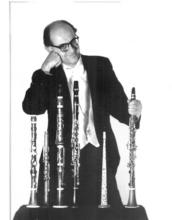Read the full obituary in the Seattle Times
William Duncan McColl passed away peacefully on January 7, 2024, of respiratory failure with his son by his side. Bill was an American clarinetist and professor of music at the University of Washington, and a founding member of both the Soni Ventorum Wind Quintet (https://soniventorum.com), and the New World Basset Horn Trio.
He was born May 18, 1933, in Port Huron Michigan, to Duncan and Margaret McColl. Bill began playing clarinet at the age of 12, and later attended the National Music Camp at Interlochen and the Oberlin Conservatory of Music (1951-1953). He graduated with honors as a student of Leopold Wlach from the Akademie für Musik und darstellende Kunst, in Vienna. He was drafted in 1956 and joined the U.S. Seventh Army Symphony Orchestra (1957-1958.) During this time the Seventh Army Wind Quintet, later known as the Soni Ventorum Wind Quintet, was formed. After that Bill joined the Philharmonia Hungarica symphony orchestra in Vienna for a year. He then moved to New York in 1959 and worked as a freelance clarinetist, even appearing on the Modern Jazz Quartet record Third Stream Music.
In 1960, Bill moved to Puerto Rico and began teaching at the Conservatory of Music of Puerto Rico, and performed with the Casals Festival Orchestra. This is where the Soni Ventorum Wind Quintet was founded, where he met his wife Sue who was a bassoonist in the Puerto Rico Symphony, and where his son was born.
In 1968 the members of the Soni Ventorum moved to the University of Washington to become the quintet-in-residence. He began his career as Professor of clarinet (1968-2006). The group had continued success in their recording careers, and international concert tours. Bill became a specialist in early clarinets and basset horns (a member of the clarinet family) and started building instruments in the 1980's with the early assistance of the UW Aerospace Research Laboratory. One of his colleagues said:
"I well recall that during some performances of a Mozart Requiem, he was proud to have been able to copy the measurements of his basset horn so well, that the joints of his reproduction fit perfectly into the original.... Certainly, he did much to further the cause of the early clarinet and his name comes up in most conversations I have with early clarinetists."
A former student of Bill's remembers:
"He discouraged gossip and hyperbole, had a fine sense of humor, and taught respect for other artists. He regularly attended his student's concerts post-graduation and set an example for courteous professional behavior. He loved the clarinet so much, you had to love it too. The music, the whole family of instruments, the sound. His encyclopedic knowledge was paired with a quest to learn new subjects all the time. He was multilingual, well-traveled, and had friends and fans everywhere. Playing with him was always a masterclass in performance. His quips and offhand commentary were always spot on."
Another former student recalls: "As a world class expert on reed making as well as antique clarinets, he was always happy to share his knowledge. He traveled to many museums and took precise measurements of antique clarinets and basset horns so that he could build wonderful replicas, which he then played in many concerts.... Even near the end of his life, he was extremely generous. He insisted on giving away his instruments to people who would make good use of them. It was important to him that his magnificent instruments be enjoyed and played."
Bill is survived by his former spouse Sue and his son Duncan. He will be missed by his bandmates, many professional colleagues and friends around the world, and by his former students.
